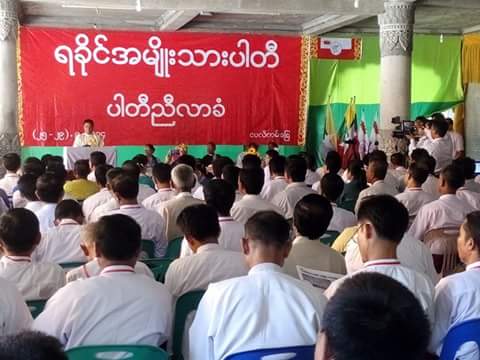RANGOON – Former members of the Arakan League for Democracy (ALD) spoke out at a meeting in Rangoon in support of splitting from the Rakhine Nationalities Development Party (RNDP), two years after the two parties merged to form the Arakan National Party (ANP).
Myo Kyaw, once a top leader within the ALD, told The Irrawaddy on Monday that 35 central executive committee members of the ANP convened a meeting at Rangoon’s Orchid Hotel, over the weekend. At the meeting, nearly all of the participants supported the move to leave the ANP.
However, final approval will be sought in October, when the members decide whether to re-form as a new party or integrate with the less popular Arakan Patriot Party (APP).
“Mostly, they encouraged us to form a party because we Arakanese have been named as extremists in both international and local communities,” said Myo Kyaw. “[The ANP’s] protests harm the image of the Arakanese and our national dignity. We completely dislike that,” he added. Most recently the ANP called for demonstrations against former UN chief Kofi Annan’s delegation to Arakan State as part of an advisory commission put together by State Counselor Daw Aung San Suu Kyi to explore solutions to ethnoreligious violence and tension in the region; the protesters, and members of the ANP, said that members of the international community should stay out of Arakan State’s “internal issues.”
The ALD was arguably at its political peak in 1990, when they swept the majority seats in the regional parliament in the general election that same year, but, like other parties—including Daw Aung San Suu Kyi’s National League for Democracy (NLD)—winning members of parliament were prevented from taking their place in government by the Burma Army.
Citing flaws in the 2008 Constitution, many well-known political parties boycotted Burma’s 2010 general election, including the ALD. The RNDP—formed by Arakanese nationalist Aye Maung—was born from within the political dilemma and, in turn, participated in the 2010 election, winning 35 out of 44 seats it contested at the regional and Union levels.
In October 2014, the RNDP and ALD convened a meeting in Arakan State’s Thandwe Township to form the ANP, in order to avoid vote-splitting in the 2015 election. This, they said, would serve as the most logical way to to compete with the popular NLD.
Yet the decision was not without dissent: some ALD members left the Thandwe conference and formed the APP, leaving the new ANP dominated by members of the RNDP.
The integrated ANP went on to secure 45 of the 77 seats in the constituencies it contested. It was not, however, able to secure the appointment of the state’s chief minister, which went to an NLD member, the party which won the election nationally. Resentment began to build when the NLD nominated former ALD members within the ANP for regional ministerial posts, and Aye Thar Aung—the former ALD chair—as deputy speaker of the Upper House of Parliament.
The RNDP-dominated ANP responded by expelling six former ALD members from the party, saying that they were acting against the organization’s interests.
In January 2016, Aye Thar Aung—also a member of the ANP central committee—told The Irrawaddy that his future with the ANP at the time appeared “uncertain.”
Tun Aung Kyaw, a former RNDP leader now serving as ANP’s secretary, told The Irrawaddy that founding a new party is the right of the former ALD members that the ANP could do nothing about it, but speculated that the Arakanese community would be “unhappy” with the move.
Khaing Kaung San, the founder of Wunlark Development Foundation, which works in Arakan State, said he forewarned that this kind of division could happen within the ANP.
“Our people don’t want the separation of the ANP,” he said.











